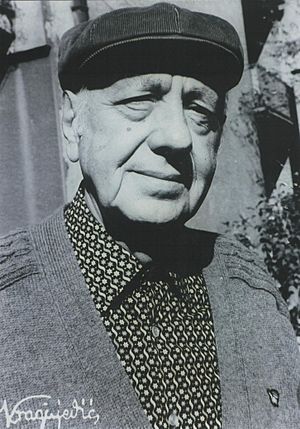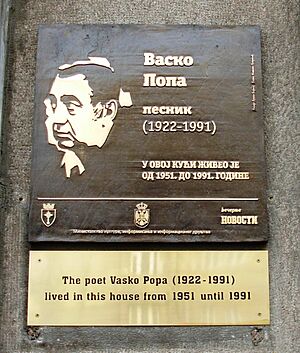Vasko Popa facts for kids
Quick facts for kids
Vasko Popa
|
|
|---|---|
| Васко Попа | |

Portrait of Popa by photographer Stevan Kragujević, 1990
|
|
| Born | 29 June 1922 Grebenac, Kingdom of Yugoslavia
|
| Died | 5 June 1991 (aged 68) Belgrade, SR Serbia, SFR Yugoslavia
|
| Occupation | poet, writer, editor, translator |
Vasile "Vasko" Popa (Serbian Cyrillic: Васко Попа) was a famous Serbian poet. He was born on June 29, 1922, and passed away on January 5, 1991. Vasko Popa was known for his special way of writing poetry. He had family roots from Romania.
Who Was Vasko Popa?
Vasko Popa was born in a village called Grebenac. This village is in a region called Vojvodina, which is now part of Serbia. Back then, it was part of Yugoslavia.
His Early Life and Studies
After finishing high school, Vasko Popa went to University of Belgrade Faculty of Philosophy. He studied there to learn more about different subjects. He also continued his studies in other big cities like Bucharest and Vienna.
Popa During World War II
During World War II, Vasko Popa joined the Yugoslav Partisans. These were groups who fought against the invaders. Sadly, he was captured and held in a German camp. This camp was in a place called Bečkerek. Today, that city is known as Zrenjanin in Serbia.
After the War: A Poet's Journey
In 1949, after the war ended, Popa finished his studies at Belgrade University. He started publishing his poems in magazines. Some of his first poems appeared in Književne novine (which means Literary Magazine). He also wrote for a daily newspaper called Borba (meaning Struggle).
Popa's Work as an Editor
From 1954 to 1979, Vasko Popa worked as an editor. He worked for a publishing company called Nolit. This means he helped decide which books would be published.
His Important Poetry Books
Vasko Popa published his first big collection of poems in 1953. It was called Kora, which means Bark. He wrote many other important books of poetry. Some of these include:
- Nepočin-polje (No-Rest Field) in 1956
- Sporedno nebo (Secondary Heaven) in 1968
- Uspravna zemlja (Earth Erect) in 1972
- Vučja so (Wolf Salt) in 1975
He also put together a collection of Serbian folk stories and poems. This book was called Od zlata jabuka (Apple of Gold). It came out in 1978.
Awards and Recognition
Vasko Popa received many awards for his poetry. He was the first person to win the Branko’s Award. This award honors another poet named Branko Radičević. In 1957, he won the Zmaj’s Award. This award celebrates the poet Jovan Jovanović Zmaj.
In 1965, Popa received an award from Austria for European literature. He also won the Branko Miljković poetry award in 1976. In 1978, he got the Yugoslav state award. He won another literary award in 1983.
Founding Literary Groups
Vasko Popa helped start important literary groups. In 1972, he founded The Literary Municipality Vršac. He also started a library of postcards called Slobodno lišće (Free Leaves). In the same year, he became a member of the Serbian Academy of Sciences and Arts.
He was also one of the people who started the Vojvodina Academy of Sciences and Arts. This academy was created in 1979 in Novi Sad.
An Award in His Name
In 1995, the town of Vršac created a poetry award named after Vasko Popa. This award is given every year. It celebrates the best book of poetry written in Serbian. The award ceremony happens on his birthday, June 29.
His Final Years
Vasko Popa passed away on January 5, 1991, in Belgrade. He is buried in a special part of Belgrade’s New Cemetery. This section is for important citizens. He was good friends with a French poet named Alain Bosquet.
What Was Popa's Poetry Style Like?
Vasko Popa wrote in a special way called modernist style. His poems were short and to the point. He was inspired by surrealism and old Serbian folk traditions. He was different from other writers of his time. Many writers in Eastern Europe used a style called Socialist Realism. Popa was the first in Yugoslavia to break away from this style after World War II.
A Unique Poetic Language
Popa created his own unique way of writing poetry. His language was often "elliptical." This means he used fewer words to say a lot. He mixed modern ways of speaking with old Serbian folk stories. He used common sayings and phrases. He also included ideas from epic poems, myths, and riddles.
In his poems, everyday life and old legends often mixed. Myths came from deep inside people's minds. Old traditions and new ideas were always interacting. Abstract ideas were shown through specific, real things. This made his poetry very special and powerful.
What Others Said About His Work
Many famous writers admired Vasko Popa's work. The English poet Ted Hughes called Popa an "epic poet." He said Popa had a "vast vision." Hughes wrote that watching Popa's journey through his books was "one of the most exciting things in modern poetry."
The Mexican poet Octavio Paz, who won a Nobel Prize, also praised Popa. He said, "Poets have the gift to speak for others. Vasko Popa had the very rare quality of hearing the others."
A well-known literary critic, John Bayley, from Oxford University, reviewed Popa's book. He wrote that Popa was "one of the best European poets writing today."
Vasko Popa's popularity grew steadily over the years. He wrote eight books of poetry over 38 years. His work was highly praised in his home country and around the world. He is one of the most translated Serbian poets. He became one of the most influential poets in the world.
Vasko Popa's Books
Poetry Books
- Kora (Bark), 1953
- Nepočin polje (No-rest Field), 1965
- Sporedno nebo (Secondary Heaven), 1968
- Uspravna zemlja (Earth Erect), 1972
- Vučja so (Wolf’s Salt), 1975
- Kuća nasred druma (Home in the Middle of the Road), 1975
- Živo meso (Raw Meat), 1975
- Rez (The Cut), 1981
- Gvozdeni sad (Iron Plantage), unfinished
Collections He Edited
- Od zlata jabuka (Apple of Gold), 1958. This is a collection of folk poems, stories, and riddles from Yugoslavia.
- Urnebesnik: Zbornik pesničkog humora (Pealing Man: Collection of poetic Humour), 1960. This book is a selection of Serbian jokes and humor.
- Ponoćno Sunce (Midnight Sun), 1962. This is a collection of poetic dream visions.
His Works Available in English
- Complete Poems., edited by Francis R. Jones, translated by Anne Pennington, with an introduction by Ted Hughes. Published in 2011.
- The Star Wizard's Legacy: Six Poetic Sequences, translated by Morton Marcus. Published in 2010.
- Collected Poems, published in 1998.
- Homage to the Lame Wolf: Selected Poems, translated by Charles Simic. Published in 1987.
- Golden Apple, published in 1980.
- Vasko Popa: Collected Poems 1943-1976, translated by Anne Pennington. Published in 1978.
- Earth Erect, published in 1973.
See also
 In Spanish: Vasko Popa para niños
In Spanish: Vasko Popa para niños
 | James Van Der Zee |
 | Alma Thomas |
 | Ellis Wilson |
 | Margaret Taylor-Burroughs |


